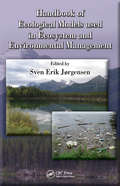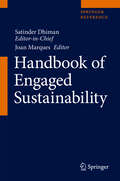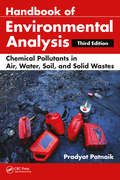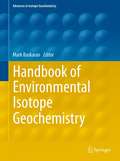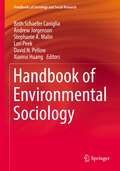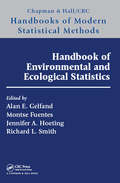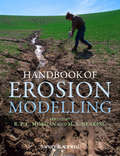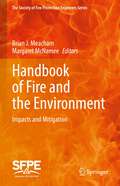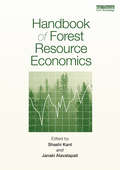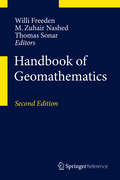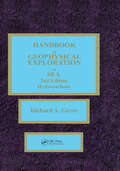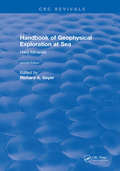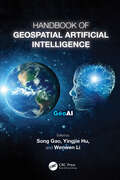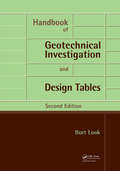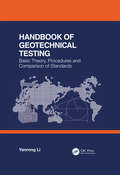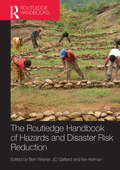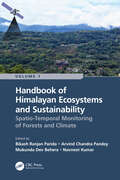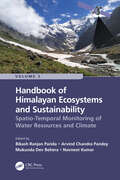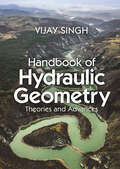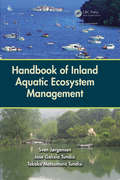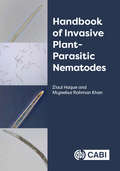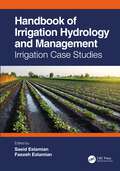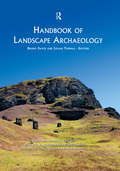- Table View
- List View
Handbook of Ecological Models used in Ecosystem and Environmental Management (Applied Ecology and Environmental Management)
by Sven Erik JørgensenIt is estimated that roughly 1000 new ecological and environmental models join the ranks of the scientific literature each year. The international peer-reviewed literature reports some 20,000 new models spanning the period from 1970-2010. Just to keep abreast of the field it is necessary to design a handbook of models that doesn't merely list them,
Handbook of Engaged Sustainability
by Satinder Dhiman Joan MarquesThis handbook is based on the premise that in order for sustainability to be sustainable, a profound psychological transformation has to take place at the individual and collective level. Focusing on the practice of environmental sustainability, this handbook will explore the application of sustainability in a wide variety of contemporary contexts—from economics of consumption and growth to government policy, sustainable cities, and sustainable planet. The editors believe that the way to achieve sustainable, harmonious living in all spheres is through lived or engaged sustainability at the personal, team, and organizational levels. It is impossible to separate economic development issues from environment issues. In its most practical aspect, sustainability is about understanding the interconnections among environment, society, and economy. This book aims to provide a comprehensive overview of current theories and approaches in the area of engaged sustainability for academics, researchers and practitioners. Specifically, it will focus on making responsible decisions that will reduce humanity’s negative impact on the environment. While various social and political initiatives for sustainability are welcome, one cannot really enact sustainability into legislative laws. Something has to change fundamentally at the level of a common person in the street. The Handbook of Engaged Sustainability acknowledges the classic literature, theories and principles in the area of sustainability, but also provides new theories and approaches from global scholars and practitioners in the field. It will also provide a well-structured pedagogical framework with real life case examples. The aim of this handbook is to expand the reader’s thinking to one of “big-picture awareness” and a “cosmic vision” of sustainability, a vision that extends from our neighborhoods to our communities, to states, countries, globe, galaxy, and envelops the entire Universe! This book will serve as an essential resource for researchers, scholars and students of sustainability, ethics, corporate social responsibility and environmental economics, as well as consultants, business and team leaders, and anyone interested in engaged sustainability.
Handbook of Environmental Analysis: Chemical Pollutants in Air, Water, Soil, and Solid Wastes, Third Edition
by Pradyot PatnaikThe Handbook will cover all aspects of environmental analysis and will examine the emergence of many new classes of pollutants in recent years. It will provide information on an array of topics from instrumentation, analytical techniques, and sample preparations to statistical calculations, chemical structures, and equations. It will present the tools and techniques required to measure a wide range of toxic pollutants in our environment. It will be fully revised throughout, and will add four new chapters (Microbial Analysis, Chlorophyll, Chlorine, Chloramines and Chlorine Dioxide, and Derivatization Reactions in Environmental Analysis).
Handbook of Environmental Isotope Geochemistry
by Mark BaskaranApplications of radioactive and stable isotopes have revolutionized our understanding of the Earth and near-earth surface processes. The utility of the isotopes are ever-increasing and our sole focus is to bring out the applications of these isotopes as tracers and chronometers to a wider audience so that they can be used as powerful tools to solve environmental problems. New developments in this field remain mostly in peer-reviewed journal articles and hence our goal is to synthesize these findings for easy reference for students, faculty, regulators in governmental and non-governmental agencies, and environmental companies. While this volume maintains its rigor in terms of its depth of knowledge and quantitative information, it contains the breadth needed for wide variety problems and applications in the environmental sciences. This volume presents all of the newer and older applications of isotopes pertaining to the environmental problems in one place that is readily accessible to readers. This book not only has the depth and rigor that is needed for academia, but it has the breadth and case studies to illustrate the utility of the isotopes in a wide variety of environments (atmosphere, oceans, lakes, rivers and streams, terrestrial environments, and sub-surface environments) and serves a large audience, from students and researchers, regulators in federal, state and local governments, and environmental companies.
Handbook of Environmental Isotope Geochemistry: Vol I (Advances in Isotope Geochemistry)
by Mark BaskaranApplications of radioactive and stable isotopes have revolutionized our understanding of the Earth and near-earth surface processes. The utility of the isotopes are ever-increasing and our sole focus is to bring out the applications of these isotopes as tracers and chronometers to a wider audience so that they can be used as powerful tools to solve environmental problems. New developments in this field remain mostly in peer-reviewed journal articles and hence our goal is to synthesize these findings for easy reference for students, faculty, regulators in governmental and non-governmental agencies, and environmental companies. While this volume maintains its rigor in terms of its depth of knowledge and quantitative information, it contains the breadth needed for wide variety problems and applications in the environmental sciences. This volume presents all of the newer and older applications of isotopes pertaining to the environmental problems in one place that is readily accessible to readers. This book not only has the depth and rigor that is needed for academia, but it has the breadth and case studies to illustrate the utility of the isotopes in a wide variety of environments (atmosphere, oceans, lakes, rivers and streams, terrestrial environments, and sub-surface environments) and serves a large audience, from students and researchers, regulators in federal, state and local governments, and environmental companies.
Handbook of Environmental Sociology (Handbooks of Sociology and Social Research)
by Lori Peek David N. Pellow Stephanie A. Malin Beth Schaefer Caniglia Andrew Jorgenson Xiaorui HuangThis handbook defines the contours of environmental sociology and invites readers to push boundaries in their exploration of this important subdiscipline. It offers a comprehensive overview of the evolution of environmental sociology and its role in this era of intensified national and global environmental crises. Its timely frameworks and high-impact chapters will assist in navigating this moment of great environmental inequality and uncertainty. The handbook brings together an outstanding group of scholars who have helped redefine the scope of environmental sociology and expand its reach and impact. Their contributions speak to key themes of the subdiscipline—inequality, justice, population, social movements, and health. Chapter topics include environmental demography, food systems, animals and the environment, climate change, disasters, and much more. The emphasis on public environmental sociology and the forward-thinking approach of this collection is what sets this volume apart. This handbook can serve as an introduction for students new to environmental sociology or as an insightful treatment that current experts can use to further their own research and publication. It will leave readers with a strong understanding of environmental sociology and the motivation to apply it to their work.
Handbook of Environmental and Ecological Statistics (ISSN)
by Alan Gelfand; Montse Fuentes; Jennifer A. Hoeting; Richard L. SmithThis handbook focuses on the enormous literature applying statistical methodology and modelling to environmental and ecological processes. The 21st century statistics community has become increasingly interdisciplinary, bringing a large collection of modern tools to all areas of application in environmental processes. In addition, the environmental community has substantially increased its scope of data collection including observational data, satellite-derived data, and computer model output. The resultant impact in this latter community has been substantial; no longer are simple regression and analysis of variance methods adequate. The contribution of this handbook is to assemble a state-of-the-art view of this interface. Features: An internationally regarded editorial team. A distinguished collection of contributors. A thoroughly contemporary treatment of a substantial interdisciplinary interface. Written to engage both statisticians as well as quantitative environmental researchers. 34 chapters covering methodology, ecological processes, environmental exposure, and statistical methods in climate science.
Handbook of Erosion Modelling
by R.P.C. Morgan M. A. NearingThe movement of sediment and associated pollutants over the landscape and into water bodies is of increasing concern with respect to pollution control, prevention of muddy floods and environmental protection. In addition, the loss of soil on site has implications for declining agricultural productivity, loss of biodiversity and decreased amenity and landscape value. The fate of sediment and the conservation of soil are important issues for land managers and decision-makers. In developing appropriate policies and solutions, managers and researchers are making greater use of erosion models to characterise the processes of erosion and their interaction with the landscape. A study of erosion requires one to think in terms of microseconds to understand the mechanics of impact of a single raindrop on a soil surface, while landscapes form over periods of thousands of years. These processes operate on scales of millimetres for single raindrops to mega-metres for continents. Erosion modelling thus covers quite a lot of ground. This book introduces the conceptual and mathematical frameworks used to formulate models of soil erosion and uses case studies to show how models are applied to a variety of purposes at a range of spatial and temporal scales. The aim is to provide land managers and others with the tools required to select a model appropriate to the type and scale of erosion problem, to show what users can expect in terms of accuracy of model predictions and to provide an appreciation of both the advantages and limitations of models. Problems covered include those arising from agriculture, the construction industry, pollution and climatic change and range in scale from farms to small and large catchments. The book will also be useful to students and research scientists as an up-to-date review of the state-of-art of erosion modelling and, through a knowledge of how models are used in practice, in highlighting the gaps in knowledge that need to be filled in order to develop even better models.
Handbook of Fire and the Environment: Impacts and Mitigation (The Society of Fire Protection Engineers Series)
by Brian J. Meacham Margaret McNameeThe fundamental purpose of this handbook is to raise awareness about environmental impacts of fire and fire suppression, primarily within the fire engineering and firefighting communities, but also within the environmental engineering and planning disciplines. The Handbook provides readers with a fundamental understanding of the problem and its magnitude and includes a set of tools and methods for assessing environmental, social and financial impacts, and a set of tools for identifying and selecting appropriate mitigation options.
Handbook of Forest Resource Economics (Routledge Environment and Sustainability Handbooks)
by Janaki R. R. Alavalapati Shashi KantIt is increasingly recognized that the economic value of forests is not merely the production of timber. Forests provide other key ecosystem services, such as being sinks for greenhouse gases, hotspots of biodiversity, tourism and recreation. They are also vitally important in preventing soil erosion and controlling water supplies, as well as providing non-timber forest products and supporting the livelihoods of many local people. This handbook provides a detailed, comprehensive and broad coverage of forest economics, including traditional forest economics of timber production, economics of environmental role of forests, and recent developments in forest economics. The chapters are grouped into six parts: fundamental topics in forest resource economics; economics of forest ecosystems; economics of forests, climate change, and bioenergy; economics of risk, uncertainty, and natural disturbances; economics of forest property rights and certification; and emerging issues and developments. Written by leading environmental, forest, and natural resource economists, the book represents a definitive reference volume for students of economics, environment, forestry and natural resource economics and management.
Handbook of Geomathematics
by Willi Freeden M. Zuhair Nashed Thomas SonarDuring the last three decades geosciences and geo-engineering were influenced by two essential scenarios: First, the technological progress has changed completely the observational and measurement techniques. Modern high speed computers and satellite based techniques are entering more and more all geodisciplines. Second, there is a growing public concern about the future of our planet, its climate, its environment and about an expected shortage of natural resources. Obviously, both aspects, viz. efficient strategies of protection against threats of a changing Earth and the exceptional situation of getting terrestrial, airborne as well as space borne data of better and better quality explain the strong need of new mathematical structures, tools and methods. Mathematics concerned with geoscientific problems, i. e. , Geomathematics, is becoming increasingly important. The 'Handbook of Geomathematics' deals with the qualitative and quantitative properties for the current and possible structures of the system Earth. As a central reference work it comprises the following geoscientific fields: (I) observational and measurement key technologies (II) modelling of the system Earth (geosphere, cryosphere, hydrosphere, atmosphere, biosphere) (III) analytic, algebraic and operator-theoretic methods (IV) statistical and stochastic methods (V) computational and numerical analysis methods (VI) historical background and future perspectives.
Handbook of Geophysical Exploration at Sea
by Richard A. Geyer Margaret AshwellThis two-volume handbook presents advanced research and operational information about hard minerals and hydrocarbons. It provides information in an integrated, interdisciplinary manner, stressing case histories. It includes review chapters, illustrations, graphs, tables, and color satellite images that present the results of gravity, geodetic, and seismic surveys and of 3-D sea floor sub-bottom visualizations. The data was obtained using satellites, aircraft, and ships from the Atlantic and Pacific Oceans, the Gulf of Mexico, and the Caribbean Sea. Major topics addressed in these volumes include geophysical methods used to explore for hydrocarbons, advanced radiometric and electrical methods for hard mineral searches, the role of geotechnology and seismic acoustics in overcoming geological hazards in selecting drilling sites and pipeline routes, and remote sensing techniques used to determine the physical properties of sediments.
Handbook of Geophysical Exploration at Sea: 2nd Editions - Hard Minerals
by Richard A. GeyerThis handbook presents advanced research and operational information about hard minerals and hydrocarbons. It provides information in an integrated, interdisciplinary manner, stressing case histories. It includes review chapters, illustrations, graphs, tables, and color satellite images that present the results of gravity, geodetic, and seismic surveys and of 3-D sea floor sub-bottom visualizations. The data was obtained using satellites, aircraft, and ships from the Atlantic and Pacific Oceans, the Gulf of Mexico, and the Caribbean Sea.Major topics addressed in these volumes include geophysical methods used to explore for hydrocarbons, advanced radiometric and electrical methods for hard mineral searches, the role of geotechnology and seismic acoustics in overcoming geological hazards in selecting drilling sites and pipeline routes, and remote sensing techniques used to determine the physical properties of hydrocarbons.
Handbook of Geospatial Artificial Intelligence
by Song Gao Yingjie Hu Wenwen LiThis comprehensive handbook covers Geospatial Artificial Intelligence (GeoAI), which is the integration of geospatial studies and AI machine (deep) learning and knowledge graph technologies. It explains key fundamental concepts, methods, models, and technologies of GeoAI, and discusses the recent advances, research tools, and applications that range from environmental observation and social sensing to natural disaster responses. As the first single volume on this fast-emerging domain, Handbook of Geospatial Artificial Intelligence is an excellent resource for educators, students, researchers, and practitioners utilizing GeoAI in fields such as information science, environment and natural resources, geosciences, and geography. Features Provides systematic introductions and discussions of GeoAI theory, methods, technologies, applications, and future perspectives Covers a wide range of GeoAI applications and case studies in practice Offers supplementary materials such as data, programming code, tools, and case studies Discusses the recent developments of GeoAI methods and tools Includes contributions written by top experts in cutting-edge GeoAI topics This book is intended for upper-level undergraduate and graduate students from different disciplines and those taking GIS courses in geography or computer sciences as well as software engineers, geospatial industry engineers, GIS professionals in non-governmental organizations, and federal/state agencies who use GIS and want to learn more about GeoAI advances and applications.
Handbook of Geotechnical Investigation and Design Tables: Second Edition
by Burt G. LookThis practical handbook of properties for soils and rock contains in a concise tabular format the key issues relevant to geotechnical investigations, assessments and designs in common practice. There are brief notes on the application of the tables. These data tables are compiled for experienced geotechnical professionals who require a reference do
Handbook of Geotechnical Testing: Basic Theory Procedures And Comparison Of Standards
by Yanrong LiDetermination of the physical, chemical and mechanical properties of ground materials is the key to successfully deliver such projects as slope stabilization, excavation and lateral support, foundation etc. A book containing both theory of geomaterial testing and up-to-date testing methods is much in demand for obtaining reliable and accurate test results. This book is intended primarily to serve this need and aims at the clear explanation, in adequate depth, of the fundamental principles, requirements and procedures of soil and rock tests. It is intended that the book will serve as a useful source of reference for professionals in the field of geotechnical and geological engineering. It can work as a one-stop knowledge warehouse to build a basic cognition of material tests on which the readers are working. It helps college students bridge the gap between class education and engineering practice, and helps academic researchers guarantee reliable and accurate test results. It is also useful for training new technicians and providing a refresher for veterans. Engineers contemplating the ICE, IOM3 and other certification exams will find this book an essential test preparation aid. It is assumed that the reader has no prior knowledge of the subject but has a good understanding of basic mechanics.
Handbook of Hazards and Disaster Risk Reduction
by Jc Gaillard Ilan Kelman Ben WisnerThe Handbook provides a comprehensive statement and reference point for hazard and disaster research, policy making, and practice in an international and multi-disciplinary context. It offers critical reviews and appraisals of current state of the art and future development of conceptual, theoretical and practical approaches as well as empirical knowledge and available tools. Organized into five inter-related sections, this Handbook contains sixty-five contributions from leading scholars. Section one situates hazards and disasters in their broad political, cultural, economic, and environmental context. Section two contains treatments of potentially damaging natural events/phenomena organized by major earth system. Section three critically reviews progress in responding to disasters including warning, relief and recovery. Section four addresses mitigation of potential loss and prevention of disasters under two sub-headings: governance, advocacy and self-help, and communication and participation. Section five ends with a concluding chapter by the editors. The engaging international contributions reflect upon the politics and policy of how we think about and practice applied hazard research and disaster risk reduction. This Handbook provides a wealth of interdisciplinary information and will appeal to students and practitioners interested in Geography, Environment Studies and Development Studies.
Handbook of Himalayan Ecosystems and Sustainability, Volume 1: Spatio-Temporal Monitoring of Forests and Climate
by Navneet Kumar Mukunda Dev Behera Bikash Ranjan Parida Arvind Chandra PandeyVolume 1: Spatio-Temporal Monitoring of Forests and Climate is aimed to describe the recent progress and developments of geospatial technologies (remote sensing and GIS) for assessing, monitoring and managing fragile Himalayan ecosystems and their sustainability under climate change. It is a collective research contribution from renowned researchers and academicians working in the Hindu Kush Himalayan (HKH) mountain range. The Himalayas ecosystems have been facing substantial transformation due to severe environmental conditions, land transformation, forest degradation and fragmentation. The authors utilized satellite datasets and algorithms to discuss the intricacy of land use/land cover change, forest and agricultural ecosystems, canopy height estimation, above-ground biomass, wildfires, carbon sequestration, and landscape restoration. Furthermore, the potential impacts of climate change on ecosystems, biodiversity and future food and nutritional security are also addressed including the impact on the livelihood of people of the Himalayas. This comprehensive Handbook explains the advanced geospatial technologies for mapping and management of natural resources of the Himalayas. Key Features Explains multiple aspects of geospatial technologies for studying fragile Himalayan ecosystems and sustainability Focuses on the utility of interferometric synthetic aperture radar (SAR) modeling for canopy height Explain how remote sensing techniques are useful for deriving the above-ground biomass, gross primary productivity (GPP), and carbon fluxes Addresses how geospatial technologies are valuable for understanding vegetation dynamics, composition and landscape restoration due to shifts in timberline and forest fires Includes contributions from global professionals working in the HKH mountain range Readership The Handbook serves as a valuable reference for students, researchers, scientists, ecologists, agricultural scientists, meteorologists, decision makers and all others who wish to advance their knowledge on vegetation remote sensing considering climate change in the HKH region.
Handbook of Himalayan Ecosystems and Sustainability, Volume 2: Spatio-Temporal Monitoring of Water Resources and Climate
by Navneet Kumar Mukunda Dev Behera Bikash Ranjan Parida Arvind Chandra PandeyVolume 2: Handbook of Spatio-Temporal Monitoring of Water Resources and Climate is aimed to describe the current state of knowledge and developments of geospatial technologies (Remote Sensing and Geographic Information Systems) for assessing and managing water resources under climate change. It is a collective achievement of renowned researchers and academicians working in the Hindu Kush Himalayan (HKH) mountain range. The HKH region is a part of the Third Pole outside the polar regions due to its largest permanent snow cover. Importantly, the Himalayan belt is geologically fragile and vulnerable to geohazards (e.g. landslides, land subsidence, rockfalls, debris flow, avalanches, and earthquakes). Therefore, critical assessment and geospatial solutions are indispensable to safeguard the natural resources and human beings in the Himalayas using space-borne satellite datasets. This book also showcases various remote sensing techniques and algorithms in the field of urban sprawling, urban microclimate and air pollution. The potential impacts of climate change on the cryosphere and water resources are also highlighted. This comprehensive Handbook is highly interdisciplinary and explains the role of geospatial technologies in studying the water resources of the Himalayas considering climate change. Key Features This book is unique as it focuses on the utility of satellite data for monitoring snow cover variability, snowmelt runoff, glacier lakes, avalanche susceptibility and flood modeling. Explain how Remote Sensing techniques are useful for mapping and managing the morphology and ecology of the Himalayan River. Addresses how geospatial technologies are valuable for understanding climate change impact on hydrological extremes, the potential impact of land use/land cover change (LULC) on hydrology and water resources management. It highlights the impact of LULC changes on land surface temperature, groundwater, and air pollution in urban areas. Includes contributions from global professionals working in the HKH region. Readership The Handbook serves as a valuable reference for students, researchers, scientists, Hydrologists, hydro-ecologists, meteorologists, geologists, decision makers and all others who wish to advance their knowledge on monitoring and managing water resources and urban ecosystem using remote sensing in the HKH region considering climate change.
Handbook of Hydraulic Geometry: Theories and Advances
by Vijay SinghHydraulic geometry describes the relations between stable channel characteristics and discharge and adjustments made by a stream in response to changes in river discharge and sediment load. This book introduces hydraulic geometry and discusses different theories and their applications in river engineering, thus providing a comprehensive summary for hydraulic engineers, as well as graduate students and researchers in fluvial geomorphology and hydraulic and environmental engineering. Topics covered include the basis of power form of hydraulic geometry relations, validity and stability of power relations, state and assumption of equilibrium, variability of exponents, variation of channel width and velocity, and the effect of stream size and river channel patterns.
Handbook of Inland Aquatic Ecosystem Management
by Sven Jorgensen Jose Galizia Tundisi Takako Matsumura TundisiCombining background knowledge and practical tools, Handbook of Inland Aquatic Ecosystem Management gives you an overview of how to manage inland waters in a holistic manner. It examines the problems that threaten aquatic inland water ecosystems and presents a set of toolboxes for solving them. The book focuses on lakes, reservoirs, ponds, rivers,
Handbook of Invasive Plant-parasitic Nematodes
by Dr Ziaul Haque Dr Mujeebur Rahman KhanPlant parasitic nematodes are major pests of agricultural crops and cause huge monetary losses. There is a very high risk of spread of plant-parasitic nematodes from one country to another, with the movement of plants and planting materials such as seeds, bulbs, corms, suckers, tubers, rhizomes, rooted plants, nursery stock and cut flowers. In view of the large quantities and the wide variety of materials being imported and exported, it is important to assess the status of invasive nematodes and their quarantine importance in relation to agricultural trade. This book contains information on around 100 invasive nematodes and their potential threat in different countries. Each nematode entry includes information on authentic identification, geographical distribution, risk of introduction, host ranges, symptoms, biology, ecology, planting material liable to carry the nematode(s), nematode vectors, chance of establishment, likely impact, and phytosanitary measures. There are detailed accounts of diagnosis procedures including sampling, isolation, detection and identification of nematodes based on morphological and molecular characters. The book offers a global perspective on invasive plant-parasitic nematodes and useful for practitioners, professionals, scientists, researchers, students, and government officials working in plant quarantine and biosecurity.
Handbook of Irrigation Hydrology and Management: Irrigation Case Studies
by Saeid Eslamian Faezeh EslamianEver-increasing population growth has caused a proportional increased demand for water, and existing water sources are depleting day by day. Moreover, with the impact of climate change, the rates of rainfall in many regions have experienced a higher degree of variability. In many cities, government utilities have been struggling to maintain sufficient water for the residents and other users. The Handbook of Irrigation Hydrology and Management: Irrigation Case Studies examines and analyzes irrigated ecosystems in which water storage, applications, or drainage volumes are artificially controlled in the landscape and the spatial domain of processes varies from micrometers to tens of kilometers, while the temporal domain spans from seconds to centuries. The continuum science of irrigation hydrology includes the surface, subsurface (unsaturated and groundwater systems), atmospheric, and plant subsystems. Further, the book includes practical case studies from around the world, including locations such as Africa, Australia, China, India, the Middle East, the United States, and more. Features: Offers water-saving strategies to increase the judicious use of scarce water resources Presents strategies to maximize agricultural yield per unit of water used for different regions Compares irrigation methods to offset changing weather patterns and impacts of climate change
Handbook of Landscape Archaeology (World Archaeological Congress Research Handbooks Ser. #1)
by Julian Thomas Bruno DavidOver the past three decades, "landscape" has become an umbrella term to describe many different strands of archaeology. From the processualist study of settlement patterns to the phenomenologist's experience of the natural world, from human impact on past environments to the environment's impact on human thought, action, and interaction, the term has been used. In this volume, for the first time, over 80 archaeologists from three continents attempt a comprehensive definition of the ideas and practices of landscape archaeology, covering the theoretical and the practical, the research and conservation, and encasing the term in a global framework. As a basic reference volume for landscape archaeology, this volume will be the benchmark for decades to come. All royalties on this Handbook are donated to the World Archaeological Congress.
Handbook of Liquid Crystals—Volume II: Advanced Aspects and Applications
by Shri SinghThis expert and self-contained authored handbook provides comprehensive coverage of liquid crystals from the fundamental materials science, physics, and modeling through cutting-edge applications. Written by an author with over 40 years of active experience in this growing field, it offers an unprecedented self-contained treatment of this key research area.Liquid Crystals are a state of matter sharing properties that are usually associated with both solids and liquids. Their study belongs to wider field of soft condensed matter physics, an area growing in importance because of the new physics being discovered and the possibilities of various technological applications being developed. Liquid crystals continue to have a revolutionary technological impact and consistently pose new challenges of basic understanding. While the experimental side of liquid crystal research is very well developed, theoretical understanding has lagged, and this volume fills a gap in the published literature in terms of rigorous treatment of mathematical and computer modeling approaches.Volume II of this handbook deals with advanced aspects of liquid crystals and their applications, covering computer simulations of phase transitions in liquid crystals, liquid crystals of biomolecules, and defect textures in liquid crystals. Overall, this handbook serves as the ultimate scholarly guide for researchers, scientists, and engineers seeking to unlock the full potential of liquid crystals. It offers a comprehensive understanding of these materials and their diverse applications, empowering readers to navigate the complex intricacies of liquid crystal science and technology.
